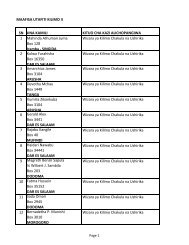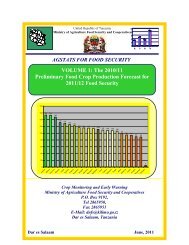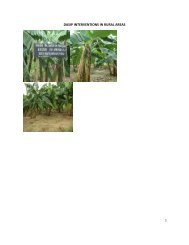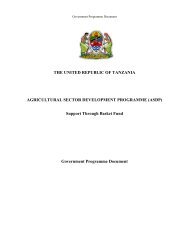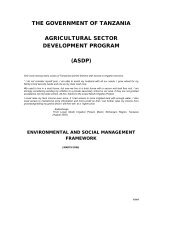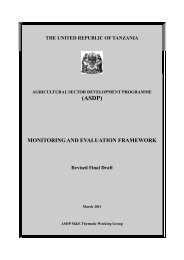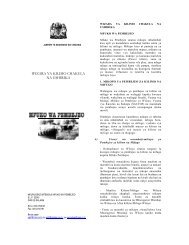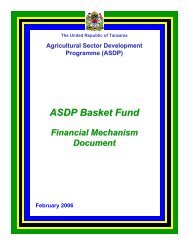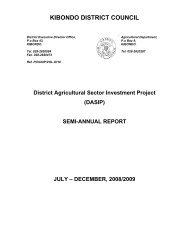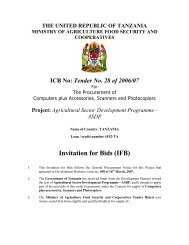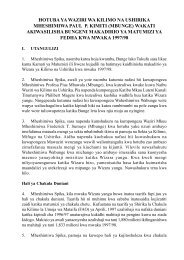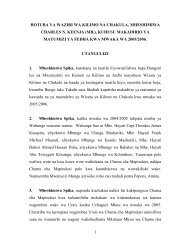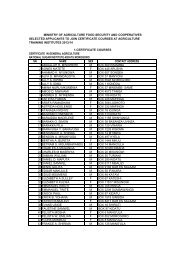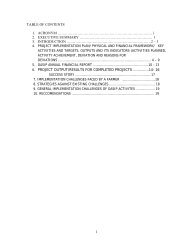Large Scale Farm Report - Ministry Of Agriculture, Food and ...
Large Scale Farm Report - Ministry Of Agriculture, Food and ...
Large Scale Farm Report - Ministry Of Agriculture, Food and ...
Create successful ePaper yourself
Turn your PDF publications into a flip-book with our unique Google optimized e-Paper software.
REGIONAL PROFILES81Virtually no paddy or cassava is grown; however beans <strong>and</strong> groundnuts are produced in small quantities. Singida has thehighest planted area of sunflower. With the exception of onions, vegetable production is not important.Virtually no irrigation is practiced <strong>and</strong> the number of farms practicing irrigation is very small (only three farms). Thenumber of large scale farms receiving extension services is relatively low.The number of trees planted on large scale farms is relatively low <strong>and</strong> the number of farms with erosion control/waterharvesting facilities is low <strong>and</strong> is mainly erosion control bunds.Singida has the fifth smallest number of farm implements in the country. It has the sixth smallest number of tractors,Seventh largest number of harvesters, seventh smallest number of harrows <strong>and</strong> also it has the seventh smallest number ofploughs.Singida has the smallest livestock population. Most of it is cattle followed by goats. The region has the smallest number ofcattle <strong>and</strong> mostly indigenous. The region is among the regions having the lowest number of goats, sheep <strong>and</strong> pigs.It has thelowest milk production <strong>and</strong> the farm gate price of milk is low. Chicken production is low <strong>and</strong> all are indigenous with lowegg production.The rate of disease infection is low except for Newcastle disease. It has a moderate to high access to livestockinfrastructure <strong>and</strong> services. The percentage of large scale farms receiving livestock extension advice is moderate <strong>and</strong> isprovided by the Government.Singida is one of the regions having a low number of farm employees. It has the fourth lowest number of permanentemployees <strong>and</strong> seventh lowest number of temporary employees. Most of them are males.4.18 DodomaDodoma has 15 large scale farms <strong>and</strong> it has the eighteenth largest l<strong>and</strong> area under cultivation (875 ha) with ninety twopercent under annual crops <strong>and</strong> most of the remaining under permanent mixed crops. The percentage of utilization of l<strong>and</strong>is relatively high. Cereals are the most important crops in the region <strong>and</strong> the region has the eleventh largest planted area ofmaize in the country, however the yield during the census year was amongst the lowest in the country. Paddy, wheat,barley <strong>and</strong> sorghum are not important in the region’s large scale farms. The production of beans, groundnuts, simsim <strong>and</strong>sunflower is small. The region is not important for large scale farms vegetable production <strong>and</strong> annual cash crops, howeverit has the second largest planted area of pigeon peas in the country.Dodoma has one of the smallest areas of irrigation in the country. Half of the large scale farms growing crops in Dodomahave access to extension advice. The region has no trees planted by large scale farms <strong>and</strong> has comparatively small amountof erosion control facilities.Dodoma has the eighth largest number of farm implements <strong>and</strong> assets. It has the fifteenth largest number of tractors,smallest number of harvester, fifth smallest number of ploughs <strong>and</strong> small number of harrows.Dodoma has the second lowest population of livestock on large scale farms in the country <strong>and</strong> there is a dominance ofcattle followed by goats <strong>and</strong> sheep, no pigs were kept on large scale farms. Dodoma has the second lowest number ofTanzania <strong>Agriculture</strong> Sample Census – 2003



